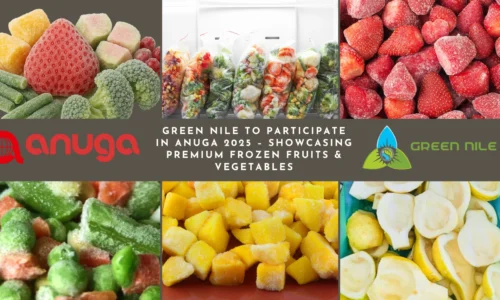
Emerging Trends in the Frozen Strawberry Industry
The frozen strawberry industry is experiencing significant transformations driven by evolving consumer preferences and technological advancements. One prominent trend is the increasing focus on sustainability. As consumers become more environmentally conscious, there is a growing demand for sustainable practices in food production, including the sourcing and processing of frozen strawberries. Companies are investing in eco-friendly packaging, reducing carbon footprints, and ensuring transparent supply chains, which contribute to the overall sustainability of the product.
Another influential trend is the rise of IQF technology, which allows strawberries to be frozen quickly and individually, preserving their flavor and nutritional content. This technology not only enhances the quality of frozen strawberries but also extends their shelf life, making them more appealing to consumers seeking high-quality, convenient food options. As the demand for premium frozen fruits increases, IQF technology is becoming a standard in the industry.
The shift towards non-GMO products is also reshaping the frozen strawberry market. Consumers are increasingly prioritizing health, leading to a surge in demand for strawberries that are free from synthetic pesticides and genetically modified organisms. Manufacturers are responding by expanding their product lines, catering to this growing section of the market that values health-conscious choices.
Furthermore, the integration of smart farming techniques is becoming essential for optimizing strawberry production. By leveraging data analytics and precision agriculture, growers can enhance yield and quality, ultimately benefiting the frozen fruit supply chain. This technological shift not only improves efficiency but also supports sustainable farming practices.
Customization is yet another emerging trend, as different markets show varied preferences for frozen strawberries. Producers are increasingly creating tailored products that meet specific dietary needs, cultural tastes, and seasonal demands, facilitating broader market reach. By adapting to these landscape shifts, the industry stands poised for growth and innovation in the coming years.
Green Nile’s Innovative Practices
Green Nile has established itself as a leader in the frozen strawberry industry by integrating innovative practices that reflect both technological advancement and a commitment to sustainability. One of the most significant investments made by Green Nile has been in next-generation IQF systems. These state-of-the-art systems ensure that strawberries are frozen quickly and efficiently, preserving their texture, flavor, and nutritional content. By investing in advanced freezing technology, Green Nile not only enhances product quality but also elevates the overall consumer experience.
The Future Outlook of the Frozen Strawberry Industry
The frozen strawberry industry is poised for significant growth in the coming years, driven by changing consumer preferences and increasing demand for convenient, healthy food options. As more individuals strive to incorporate nutritious food into their diets, frozen strawberries provide a versatile solution that retains flavor and nutrition. Market research indicates a steady rise in the consumption of frozen fruits, projecting a compound annual growth rate (CAGR) that underscores the sector’s robustness. This trend suggests a vital market opportunity for producers, particularly those who are innovative and responsive to consumer needs.
Innovation and sustainability will be paramount for success in the frozen strawberry market. As environmental concerns continue to rise, companies must focus on adopting sustainable practices throughout their supply chains. This includes implementing eco-friendly farming methods and reducing waste, which can enhance brand reputation and appeal to environmentally-conscious consumers. Sustainable sourcing and production processes not only align with global efforts to combat climate change but also serve as a competitive advantage in the market.
Green Nile exemplifies how industry leaders can merge traditional agriculture with modern practices, ensuring the long-term viability of their operations. By leveraging technology to improve yield and efficiency, companies like Green Nile are strategically positioned to capitalize on market changes. Advancements in refrigeration and processing technologies further enhance the quality and shelf-life of frozen fruits, catering to consumer demands for freshness and convenience.
In addition to operational improvements, businesses must also adapt to shifts in consumer behavior. With an increased inclination towards plant-based diets and healthier lifestyles, frozen strawberries can be seamlessly integrated into a variety of dishes, from smoothies to desserts. This versatility serves as an advantage for producers aiming to capture a wider audience. As the frozen strawberry industry continues to evolve, it is evident that those who innovate and prioritize sustainability will lead the way in shaping a fruitful future.
Conclusion: Green Nile Leading the Charge
In recent years, the frozen strawberry industry has undergone significant transformations, driven by a growing demand for high-quality, sustainably sourced products. Green Nile stands at the forefront of this evolution, demonstrating a commitment to innovation and excellence in every aspect of their operation. From state-of-the-art farming practices to eco-friendly packaging solutions, Green Nile is not only meeting consumer expectations but also setting new industry benchmarks.
One of the key elements underpinning Green Nile’s success is their dedication to quality. By employing advanced agricultural techniques and carefully selecting the best fruit varieties, the company ensures that their frozen strawberries retain exceptional flavor and nutritional value. Furthermore, their rigorous quality control processes guarantee that every product reaching consumers is of the highest standard, fostering trust and loyalty in a competitive marketplace.
Sustainability is another cornerstone of Green Nile’s philosophy. The firm’s initiatives to reduce waste, utilize renewable energy sources, and implement responsible water management practices reflect a broader commitment to environmental stewardship. These efforts not only contribute to the health of the planet but also resonate with a consumer base that increasingly favors brands demonstrating a proactive approach to sustainability.
Innovation remains an integral component of Green Nile’s strategy, with ongoing research and development leading to the introduction of cutting-edge technologies and methodologies. This focus not only enhances operational efficiencies but also positions the brand as a leader in navigating the complexities of modern food production.
As consumers become more informed and discerning, the implications of these advancements extend beyond mere product preference. Readers are encouraged to reflect on how sustainability, quality, and innovation in the frozen strawberry sector influence their purchasing decisions. By supporting companies like Green Nile, individuals can contribute to a healthier, more sustainable future for food consumption.




